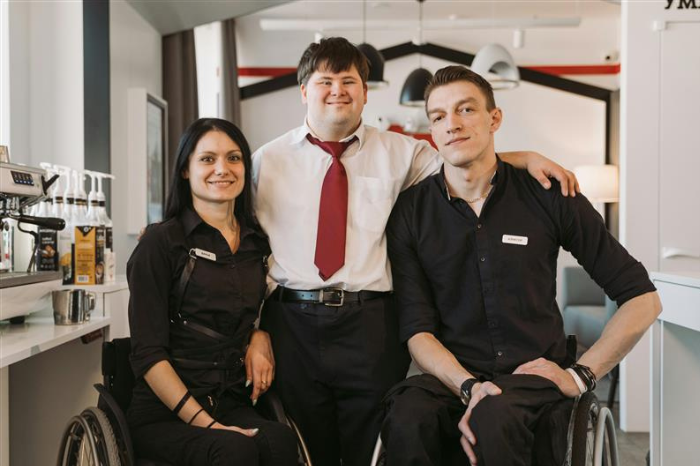
As a National Disability Insurance Scheme (NDIS) service provider, it’s clear you’re in the business of empowering people with disability. After all, you wouldn’t be in the industry otherwise.
So, as a service provider, how can you best be of service to your current and future clients at every stage of their NDIS journey?
It’s good to understand the NDIS journey, the way potential participants will traverse that journey, and how you and your business can be of assistance.
Kinora is My Plan Manager’s online community – a platform that connects people with disability with each other as well, as with providers. Kinora has loads of free, accessible content to support participants and their supporters, as well as providers, to understand the NDIS and how to best navigate it.
As a provider, you won’t want to miss this NDIS Basics for Providers webinar. Settle in for 60 minutes and get a thorough understanding of the NDIS and everything providers need to know.
The NDIS journey is one with many critical junctures, where participants will need extra support from their providers. We’ll explain what happens at each point, what participants need to do, and how you, as their trusted professional, can be of assistance.
1. Applying for the NDIS
This is when parents or carers of children with disability and adults with disability and/or their supporters will contact the National Disability Insurance Agency (NDIA) and begin the process of applying to become participants in the Scheme.
The NDIA has lists of disability diagnoses which are likely to be automatically accepted as needing NDIS support. Here’s a list of conditions that are likely to meet the NDIA’s disability requirements.
There are also lists of conditions which are likely to result in a person being permanently impaired, thus they are also eligible for the Scheme. You can find out more here.
However, anyone can apply for the NDIS. They must have evidence of how their disability impacts on their functional capacity, which is their ability to live their day-to-day life.
What the applicant needs to do
Fill out an Access Request Form or phone the NDIA on 1800 800 110.
How providers can help
Are you already working with someone who plans to apply to the NDIS? Your evidence about your client’s functional capacity is crucial to the outcome of their access request. This could be supplied as a report, an assessment, or a letter. Professionals should also fill out Section 2 of the Access Request Form.
Important!
Your evidence must be factual and it should not shy away from conveying what life is like for your client on their worst day.
TIP: There are three options for NDIS participants to manage their plans. They can elect to be plan managed, to self manage, or to have the NDIA manage their plan (Agency managed).
Plan managed and self managed participants are free to choose from any providers. However, Agency managed participants are only able to use professionals who are registered NDIS providers. You can find out more about getting registered here.
2. Planning meeting
What the participant needs to do
Now the NDIA has accepted the access request, the person with disability is known as a participant in the NDIS. The participant and their supporters will meet with their NDIA Planner or Local Area Coordinator (LAC), and together they’ll discuss the participant’s current life, hopes, and plans for the future. They’ll also support the participant to set their goals.
How providers can help
If you’re already working with a participant, you can help them prepare for their planning meeting by reporting on what they’re already doing and providing a specific roadmap as to how your supports could assist them to achieve their goals. Remember to consider how you could expand your support to assist the participant:
Important!
Goals are some of the most important parts of a participant’s NDIS plan. It’s where providers can really provide support and advice to families. Need some prompts to help your client get started? Find eight prompts from Kinora on setting goals here.
3. Implementation meeting – for new participants
What the participant needs to do
Implementation meetings are not compulsory, but they come highly recommended for new participants who are joining the Scheme for the first time. Held within the first 28 days after a plan has been finalised, an implementation meeting will be scheduled by the participant’s LAC if they have one.
Participants can use this meeting to ask questions about their plan and how to use their funding, raise any concerns, find out what they can and can’t buy with their funds and – crucially, for you – receive advice about finding providers and setting up service agreements and service bookings.
Participants can also ask about extra supports they could access, like community or mainstream supports.
How providers can help
This is another opportunity for participants to know about you and your services as a provider. If you’re a registered NDIS provider, LACs and participants can find you on the NDIS Provider Finder.
Important!
Only providers who have registered with the NDIS Quality & Safeguards Commission will be listed on the Provider Finder. Registered providers are then authorised to use the logos ‘I/We Heart the NDIS’ and ‘I/We Support the NDIS’, along with the text ‘NDIS Registered Provider’. For more information, click here.
4. Assessment of the plan
What the participant needs to do
Again, this isn’t compulsory, but it’s highly recommended – a review every three months to see how everything is tracking with their plan. Participants may review this themselves, check in with their LAC or an advocate, or reach out to their providers.
How providers can help
Using quarterly reviews is a great way of checking in with participants and seeing how your working relationship is progressing. How have your supports or sessions been of assistance? Is your client still engaged with what you’ve been doing or is it time to introduce some variety – which could be new activities or even a new environment?
Quarterly reviews also allow you to speak with your client about their plan and their spending and what stage their plan is at – if it’s coming towards the end of their plan, now is the time to talk about report writing and supporting documentation that you can help with in the lead up to their plan reassessment.
Important!
Sometimes we can just drift along in our work with clients because everything seems to be on track and clients are satisfied. Of course, that’s great, and that doesn’t mean that every single session or day has to be a winner – after all, is every single person on the planet optimising every moment and smashing a goal every single day? Of course they’re not.
Participant journeys should have peaks and troughs like everyone else. But, as providers, we should always be keeping our clients’ goals front of mind and supporting the journey of progression, whether it’s paused or moving slowly forward.
5. End of the plan
What the participant needs to do
Participants should be prepared to hear from the NDIA about six weeks before the end date of their current plan, in readiness for a plan reassessment. If they haven’t had any contact, it’s important to be proactive and contact the NDIA on 1800 800 110.
How providers can help
This is where your reports about the work between the participant and you will be vital. Remember – NDIA Planners and LACs will not know what progression has occurred without personalised, detailed reporting from you. This will support your participant’s experience of working with you and how it’s supported their progression towards their goals. For more information about reporting for participant plan reassessments, click here.
Important!
The NDIA has provided specific advice about what allied health providers should include in reports for plan reassessments. The prompts will be helpful for many providers, and the Agency has included report writing tips too.
Of course, providers are there for support throughout a participant’s entire plan. You can make it easier for participants and their supports to find you and work with you by being a fair, respectful, and honest provider. That means:
Want to know more about becoming a provider of choice? Join Kinora as a service provider for free and become part of a community that’s working together to ensure participants and providers get great outcomes.


